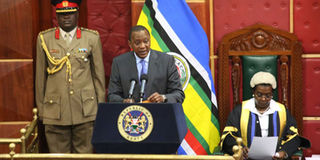Judges overturn ruling excusing President Kenyatta from trial

President Uhuru Kenyatta addresses East Africa Legislative Assembly members at the National Assembly in Nairobi on November 26, 2013. ICC judges on the same day reversed an earlier ruling allowing him to skip some sessions of his case at The Hague. PHOTO | BILLY MUTAI
What you need to know:
- Attorney-General Githu Muigai told reporters he was hopeful the reversal of the ruling would have little impact if ASP members adopt the proposed amendments
- ICC prosecutor Fatou Bensouda sprung a surprise request to amend the rules to allow her to use statements of witnesses not in court
The International Criminal Court has reversed an earlier decision allowing President Kenyatta to skip sessions in The Hague.
According to the decision by Trial Chamber V (b), the earlier ruling to allow the President to be away during his trial has been put aside.
This follows a decision by the Appeals Chamber, in the Ruto case, which said that the accused must be in court unless excused by the judges in exceptional circumstances.
As the decision was being announced, a Kenyan delegation was fighting at an ICC meeting to have the President and Deputy President William Ruto excused from attending all court sessions and also to attend some of them by video link.
Attorney-General Githu Muigai — who is leading the delegation — told reporters in The Hague after an ASP meeting on Tuesday evening that he was hopeful the reversal of the ruling would have little impact if ASP members adopt the proposed amendments.
“President Kenyatta will be allowed to skip trials at The Hague if specific rules and procedure (of evidence) presented by Kenya is adopted by the working group on Thursday.”
SURPRISE REQUEST
At the same meeting, called the Assembly of State Parties, ICC prosecutor Fatou Bensouda sprung a surprise request to amend the rules to allow her to use statements of witnesses not in court.
Usually, witnesses must give evidence in person and be questioned by the person they have accused.
On Tuesday, the Trial Chamber said all requests to be away will be determined on a case-by-case basis.
“The chamber reconsidered its previous decision excusing Uhuru Muigai Kenyatta from continuous presence at trial, in light of the legal clarifications provided by the Appeals Chamber in its recent judgment on the matter,” said a statement from the ICC.
The judges explained that their change of heart was motivated by an Appeals Judgement’s decision the Ruto-Sang case which they said provided important new information.
“The Appeals Chamber had concluded that a Trial Chamber enjoys discretion under article 63(1), which states that “the accused shall be present during the trial”, but that such discretion was limited,” said the judges.
The Appeals Chamber had further ruled that absence is only permissible under exceptional circumstances, and must be limited to that which is strictly necessary. The reversal of the decision followed a motion filed by Ms Bensouda on October 28.
Mr Kenyatta is charged, as an indirect co-perpetrator, with five counts of crimes against humanity consisting of murder, deportation or forcible transfer, rape, persecution and other inhumane acts allegedly committed during the poll violence in 2007/08.
But on Tuesday evening, Attorney-General Githu Muigai was busy fighting to block attempts to push through amendments on Article 68 of the rules of procedure and evidence.
Ms Bensouda wants pre-recorded audio, video and written statements from witnesses unable to be physically present in court, be accepted as evidence. The move came just as Kenya awaited a plenary decision on an amendment seeking to free suspects from physical presence in court through introduction of video conferencing.
The decision expected at 5.30pm Kenyan time was delayed to give parties time to lobby for or against the various proposed amendments.
If Ms Bensouda’s request is adopted as proposed, then the statements recorded from witnesses in the Kenya cases could be used in court and past proceedings reopened if affected by the testimonies.




